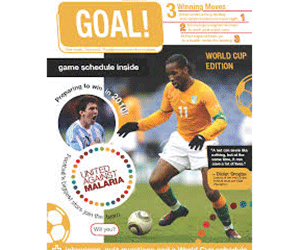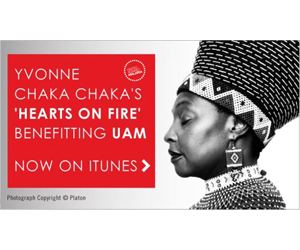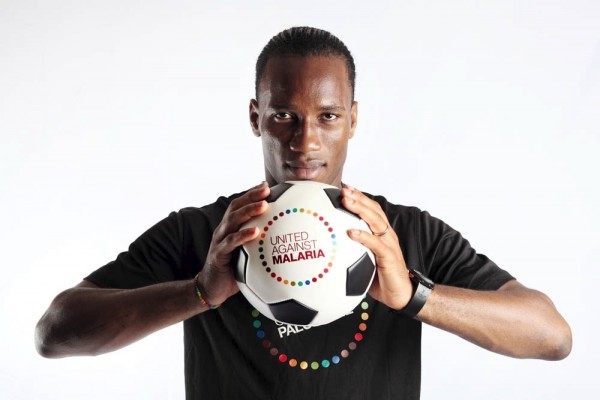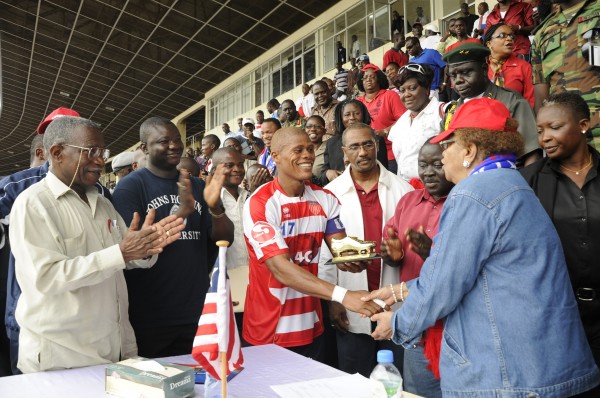The United Against Malaria (UAM) Campaign came together this evening at the “Celebrate Africa—The Grand Finale Concert” at the Coca-Cola Dome in Johannesburg to honor the lasting legacy of the 2010 FIFA World Cup, and generate further support and awareness in the fight against malaria, a preventable and treatable disease that takes the life of an African child every 30 seconds.
UAM campaigner Yvonne Chaka Chaka introduced multi-award winning Italian tenor Andrea Bocelli, celebrated Canadian singer/songwriter Bryan Adams, and South Africa’s own soprano sensation, Pretty Yende who topped the bill at the “Celebrate Africa” concert to help raise awareness for United Against Malaria – a partnership of football teams and players, celebrities, health and advocacy organizations, governments, corporations, and individuals who have united ahead of the 2010 World Cup to build support to reach the international target of reducing malaria deaths to near zero by 2015.
Every year, there are about 250 million malaria cases and nearly one million deaths worldwide. Malaria also contributes to the cycle of poverty and limits economic development with the United Nations estimating that malaria costs Africa $12 billion each year in direct economic losses, and much more in lost productivity. There has been significant progress in delivering long-lasting insecticide treated mosquito nets and indoor spraying, in addition to new front line treatments. However, sustained efforts are required to reach the international target of reducing malaria deaths to near zero by 2015.
Football has a universal reach across Africa and is loved by children, national presidents and CEOs alike. Through the United Against Malaria partnership, football players, teams and national football associations have demonstrated their support for the campaign and harnessed the power of football to drive the fight against malaria and reduce its impact on their teams and communities. The lasting legacy of the 2010 FIFA World Cup and UAM is the strong commitment of national football associations in endemic countries to continue to share these messages of malaria prevention and treatment with citizens across Africa.
“We are immensely proud of our country’s achievements in hosting the world cup, the first to be held on African soil. However, we have witnessed firsthand the terrible effects that malaria has on the lives of our players and ordinary people across Africa. As the 2010 FIFA world cup comes to an end our support for the UAM campaign and efforts to tackle this preventable disease will continue in the hope that one day an African team will win the world cup,” said Mark Fish, African football legend and former South African international player.
World Cup heroes, the Ghanaian national team, have been among the most active supporters of the campaign. The Ghana Football Association promoted the United Against Malaria campaign during their qualifying matches and recorded public service announcements with the national squad, including stars such as Stephen Appiah and Asamoah Gyan, which have been aired across national television networks in Ghana around the World Cup. These films have a simple message – reminding people in a country where malaria is responsible for 22 percent of deaths in children under the age of five, that their lives can be saved by sleeping under a net.
Other African footballing legends including Lucas Radebe, Mark Fish, Roger Milla, Kolo Touré and Joseph-Antoine Bell, along with international star Landon Donovan have also played an active role in the campaign through similar activities.
One of the major challenges in the coming years will be to sustain efforts and ensure that treatment and prevention tools are used correctly. The involvement of football in the campaign has helped to engage political and business leaders to deliver messages to make sure that mosquito nets are used and used correctly. The lasting legacy of the 2010 FIFA World Cup and UAM is to maximise football’s universal appeal and help continue to drive this disease out of Africa.
“The 2010 FIFA World Cup has provided a wonderful opportunity to create a lasting legacy in the fight against malaria. I am delighted to be involved in the UAM campaign and look forward to continuing the momentum we have built by linking football to malaria in Africa,” said Chaka Chaka, who has been a tireless ambassador for the UAM campaign in the lead up to the World Cup and will also take its message to the African Union Summit in Uganda later this month.
In addition to raising public awareness and driving political action around malaria, the UAM campaign also aims to leave a practical and lasting legacy in the host nation of the World Cup through its malaria bracelet programme. Launched to coincide with the 2010 FIFA World Cup the bracelets have not only contributed to raising funds for the fight against malaria in Africa, but also to providing employment for low skilled workers in Khayelitsha township in Cape Town, where unemployment stands at over 50 percent.
The aim of the programme is to sell one million bracelets. This ambitious target will raise $1 million for malaria projects in Africa through to the Global Fund to Fight AIDS, Tuberculosis and Malaria and pump $2 million into the local economy. Bracelets were on sale at the concert in Johannensburg and are also available for purchase at United Against Malaria.





